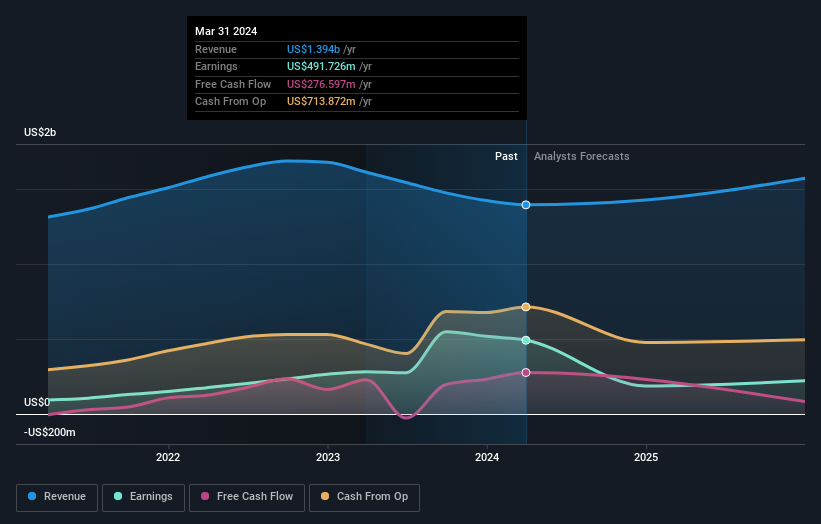Earnings Beat: Tower Semiconductor Ltd. Just Beat Analyst Forecasts, And Analysts Have Been Updating Their Models
It's been a pretty great week for Tower Semiconductor Ltd. (NASDAQ:TSEM) shareholders, with its shares surging 11% to US$36.71 in the week since its latest first-quarter results. Revenues were US$327m, approximately in line with expectations, although statutory earnings per share (EPS) performed substantially better. EPS of US$0.40 were also better than expected, beating analyst predictions by 12%. Earnings are an important time for investors, as they can track a company's performance, look at what the analysts are forecasting for next year, and see if there's been a change in sentiment towards the company. We thought readers would find it interesting to see the analysts latest (statutory) post-earnings forecasts for next year.
Check out our latest analysis for Tower Semiconductor
Taking into account the latest results, the current consensus from Tower Semiconductor's four analysts is for revenues of US$1.43b in 2024. This would reflect a modest 2.3% increase on its revenue over the past 12 months. Statutory earnings per share are expected to plummet 62% to US$1.67 in the same period. Before this earnings report, the analysts had been forecasting revenues of US$1.41b and earnings per share (EPS) of US$1.58 in 2024. The analysts seems to have become more bullish on the business, judging by their new earnings per share estimates.
The consensus price target rose 15% to US$44.20, suggesting that higher earnings estimates flow through to the stock's valuation as well. There's another way to think about price targets though, and that's to look at the range of price targets put forward by analysts, because a wide range of estimates could suggest a diverse view on possible outcomes for the business. There are some variant perceptions on Tower Semiconductor, with the most bullish analyst valuing it at US$55.00 and the most bearish at US$37.80 per share. As you can see, analysts are not all in agreement on the stock's future, but the range of estimates is still reasonably narrow, which could suggest that the outcome is not totally unpredictable.
These estimates are interesting, but it can be useful to paint some more broad strokes when seeing how forecasts compare, both to the Tower Semiconductor's past performance and to peers in the same industry. We would highlight that Tower Semiconductor's revenue growth is expected to slow, with the forecast 3.1% annualised growth rate until the end of 2024 being well below the historical 5.3% p.a. growth over the last five years. Compare this against other companies (with analyst forecasts) in the industry, which are in aggregate expected to see revenue growth of 17% annually. So it's pretty clear that, while revenue growth is expected to slow down, the wider industry is also expected to grow faster than Tower Semiconductor.
The Bottom Line
The biggest takeaway for us is the consensus earnings per share upgrade, which suggests a clear improvement in sentiment around Tower Semiconductor's earnings potential next year. On the plus side, there were no major changes to revenue estimates; although forecasts imply they will perform worse than the wider industry. There was also a nice increase in the price target, with the analysts clearly feeling that the intrinsic value of the business is improving.
With that said, the long-term trajectory of the company's earnings is a lot more important than next year. We have forecasts for Tower Semiconductor going out to 2025, and you can see them free on our platform here.
However, before you get too enthused, we've discovered 2 warning signs for Tower Semiconductor (1 makes us a bit uncomfortable!) that you should be aware of.
Have feedback on this article? Concerned about the content? Get in touch with us directly. Alternatively, email editorial-team (at) simplywallst.com.
This article by Simply Wall St is general in nature. We provide commentary based on historical data and analyst forecasts only using an unbiased methodology and our articles are not intended to be financial advice. It does not constitute a recommendation to buy or sell any stock, and does not take account of your objectives, or your financial situation. We aim to bring you long-term focused analysis driven by fundamental data. Note that our analysis may not factor in the latest price-sensitive company announcements or qualitative material. Simply Wall St has no position in any stocks mentioned.

